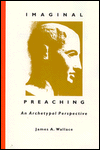
"How we think about the speaking event tells us as much about ourselves as the culture in which we are reared and nurtured. If we conceive the speaking event as rhetorical, our energies are directed to all or several of the following: to persuade, to convince, to exhort, in short, to move a person to have a 'concept,' 'product,' 'conviction,' as close to the speaker's as possible, or better yet, to have a belief system identical to the speaker. The long and the short of the rhetorical model is that there is a sensed reaction of success or failure, of win or loss, of achievement or lack of it. Powerful speakers have vast audiences, largely already convinced of the speaker's beliefs and system of thought. There is nowhere to go with this model. These speakers are 'charismatic,' 'solid,' 'logical,' 'thrilling.' It is, in short, something of a star-system model. It is an ego-driven model; it is, virtually, our 'cultural favorite,' if the troth be known. It is also, and lamentably for the religious speaker, something of a 'royalty of the mountain' phenomenon, leaving those less blessed with these formidable skills located in a speaker's purgatory.
"What if there were another model for the speaker of soul, a model that is not based upon the rhetoric of persuasion, but is, rather, centered upon the psychological experience common to humankind? This model would be revelatory, irnaginal, and psychological. It is this model that Father James Wallace explores in this astonishingly vital and inspiring book, Imaginal Preaching. Based upon the analytical psychology of Carl Gustav Jung and the archetypal psychology of James Hillman, Imaginal Preaching validates the persistence of image and its integrity as the alternative to rhetoric. It approaches preaching as poesis, an act of making, shaping, and forming of--and by--images.
"In the summer of 1993, I had the opportunity to explore the constructs and explorations of Father Wallace's text with pastors enrolled in the Association of Chicago Theological Schools' Doctor of Ministry in Preaching Program. From the intensity of personal experience, I know the power Father Wallace's contribution can make to the education of preachers. Teaching from the text which follows simply reorganized and reoriented experienced preachers allowing, as one put it, '... to experience for the first time not only my own religious images, but the authority of these images that originate from my own soul.' The restoration of 'soul' to the 'preaching event' must be experienced as a full extension of one of Jung's favorite phrases: dixi et animam salvavi ('I spoke and saved my own soul')." - Lee Zahner-Roloff, Professor Emeritus, Northwestern University, Training Analyst, C.G. Jung Institute of Chicago
(Purchase of this book helps you qualify for the free shipping option if it is being offered at the time of your order.)